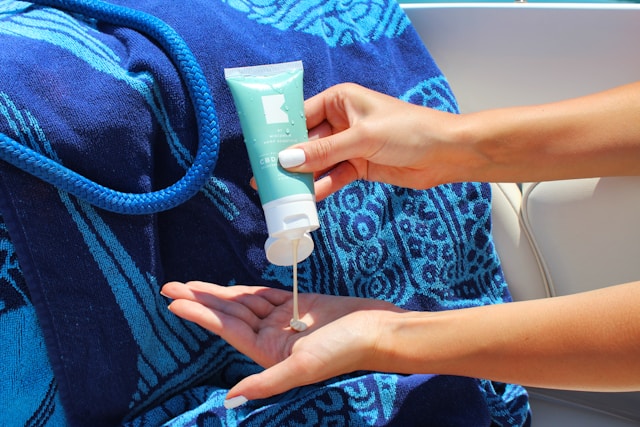Sunscreen in Winter? Yes! Here’s Why It’s a Must

Most people associate sunscreen with hot summers and sandy beaches under intense sunlight. People frequently overlook the fact that sunscreen protection should remain essential throughout winter months just like summer months. People fail to recognize that although the sun feels less hot it continues to transmit dangerous ultraviolet (UV) rays.
Sun damage becomes more pronounced under particular winter atmospheric conditions. Your daily skincare practice requires a change because you should not leave sunscreen out when colder months arrive. People should use sunscreen as an essential item throughout every season due to several important reasons.
UV Rays continue to Exist throughout every Month of the Year
When winter arrives it does not eliminate the damaging UV rays that the sun continuously produces. The sun emits two types of UV radiation that impact our skin: UVA and UVB. UVA rays have strong penetrative power that reaches deep skin layers to create wrinkles and increase cancer risks besides causing premature ageing. UVB rays inflict sunburns and skin damage on the human body.
UV rays penetrate the atmosphere to such an extent that they can reach 80% of your skin during even the darkest cloudy winter days thus causing harm to accumulate throughout time. Consistent sun exposure throughout the years leads to worsening skin problems which results from not using sunscreen even during winter.
Snow and Ice Increase UV Exposure
The necessity of sunscreen application in winter depends heavily on the way snow and ice reflect UV rays. The reflective properties of snow reach 80% of UV radiation which exposes your skin to sunlight that reflects both from above and below. Sunburn risks become particularly high because of the double UV exposure which targets the facial area and the neck and lips specifically.
Skiing enthusiasts and outdoor winter athletes must apply sunscreen because it remains an absolute necessity for their activities. Higher altitudes produce stronger UV radiation that requires additional sun protection for people who participate in winter sports activities.
Winter Sun Can Still Cause Skin Damage
The weaker sun feeling during winter months cannot hide its power to create skin damage. Many people develop a mistaken belief about sunscreen usage because of cold weather conditions that create an illusion of safety. UV rays persist throughout the entire year while producing amplified damage when cold winter factors are involved.
Exposure to cold air together with powerful winds causes skin dehydration which increases your vulnerability to both UV rays and skin irritations. Daily sunscreen application forms a protective layer that defends your skin against UV radiation as well as outside stressors.
Cloudy Days Don’t Block UV Rays
Most people believe sunscreen protection is needed only when the sun is very bright. UV rays will pass through cloudy conditions to reach your skin throughout the entire winter season no matter how dark it becomes. The sun’s rays succeed in penetrating through 80% of cloud cover together with fog and mist. No matter what the weather looks like you remain susceptible to dangerous rays generated by the sun.
The practice of not using sunscreen on overcast days leads to unwanted sun exposure that creates premature ageing skin conditions as well as pigmentation problems and raises your cancer risk.
Sunscreen Helps Prevent Premature Aging
UV exposure causes the skin to age before its time among the most apparent consequences of sun exposure. UVA rays destroy collagen and elastin structures in skin tissue which eventually results in the formation of wrinkles and loose skin. Skin shows the effects of ageing slowly which leads people to miss its progression until they spot visible signs of ageing.
You should wear sunscreen every day including winter months to shield your skin from destructive UV rays thus maintaining youthful good health. People who wish to sustain a youthful and radiant complexion through the years must include sunscreen as a mandatory component of their skincare regimen.
It Reduces the Risk of Skin Cancer
The occurrence of skin cancer stands among the highest cancer types while ultraviolet radiation exposure represents a major contributing factor to its development. The risk of sunburning people during wintertime remains high particularly when they spend time in snowy regions. Long-term exposure to sunlight accumulates to raise the possibility of skin cancer development which requires constant protection throughout the year.
The use of regular sunscreen protects people from dangerous UV rays which stops DNA damage to skin cells. Despite being colder outside the dermatological community advises people to use sunscreen with broad-spectrum protection and SPF 30 to defend against UVA and UVB rays.
Sunscreen Keeps Your Skin Hydrated
The skin faces severe weather-related problems during winter months because it becomes dried out and develops both flaking and discomfort. The combination of cold temperatures and powerful winds along with heated indoor spaces depletes skin moisture until it becomes sensitive to harm.
Sunscreens that contain hydrating components including hyaluronic acid alongside glycerin and ceramides function to retain moisture while also making your skin smooth and hydrated. Winter skincare benefits from sunscreen usage because it delivers moisture protection along with environmental protection.
It Prevents Hyperpigmentation and Uneven Skin Tone
The skin develops hyperpigmentation when exposed to sunlight which results in dark spots and melasma and skin discoloration. The situation becomes critical for people who deal with pigmentation issues because UV rays tend to intensify their conditions with each passing year. Pigmentation development remains a serious problem during winter because sun exposure causes similar risks as summer does.
Repetitive sunscreen application protects your skin tone because it stops UV rays from Penetrating your skin while maintaining an even complexion. The use of retinoids exfoliating acids or vitamin C skincare treatments requires extra protection from sunscreen because these products increase skin sensitivity to UV radiation damage.
Lips and Eyes Need Protection Too
Many individuals overlook applying sunscreen to their lips and eyes even though these areas develop equivalent sun damage risks. The eyes suffer from two vulnerabilities because their skin possesses less thickness and greater sensitivity which leads to early wrinkles and faint lines due to sun exposure.
Protecting your eyes from UV rays becomes possible by wearing sunglasses with UV protection along with applying sunscreen-infused eye cream. The skin of the lips tends to become both dry and chapped and prone to sunburn during winter months. Lips stay moisturized while protected from damage when you use an SPF lip balm.
Choosing the Right Sunscreen for Winter
When searching for sunscreen during winter it becomes essential to select a specific product which will ensure proper protection. The best sunscreen option for complete protection should include broad-spectrum features with at least SPF 30 to block UVA and UVB rays. People who have dry skin should select a sunscreen formulation with moisturizing ingredients to protect their skin from winter dryness.
People who have oily or acne-prone skin should use sunscreen that is lightweight and non-blocking to the skin pores. People who spend time in snowy or high-altitude locations should protect their skin by using water-resistant sunscreens with higher SPF values for extended sun protection.
Include Sunscreen Into Your Winter Routine
The practice of sunscreen application becomes automated during winter because you simply add it to your daily skincare process. Use sunscreen as your last skincare step after applying moisturizer just before putting on your makeup. A small piece equivalent to a nickel works for the face and you should also protect the neck ears and hands.
The same two-hour reapplication rule applies between winter days when you spend extended time outdoors. Travel-sized sunscreens combined with moisturizers that contain SPF make daytime reapplication more accessible during your outdoor activities.
Conclusion
You need sunscreen throughout the entire year because it shields your skin from UV radiation that causes premature ageing and skin cancer in addition to protecting you from UV damage. The combination of winter sunlight and reflective snow along with cloud cover leads to total sun exposure so sunscreen should be used every day during cold seasons.
Your year-round skin protection depends on selecting appropriate sunscreen while maintaining its regular use which ensures both hydration and safety of your skin. Sunscreen requirements persist throughout the entire year because winter conditions do not exempt you from its necessary use.








